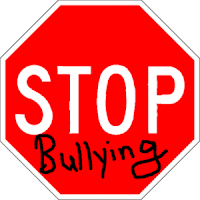Bullying may be defined as the activity of repeated, aggressive behavior intended to hurt another person, physically or mentally. Bullying is characterized by an individual behaving in a certain way to gain power over another person. Norwegian researcher Dan Olweus says bullying occurs when a person is exposed, repeatedly and over time, to negative actions on the part of one or more other persons. He says negative actions occur when a person intentionally inflicts injury or discomfort upon another person, through physical contact, through words or in other ways.
Bullying is the use of force or coercion to abuse or intimidate others. The behavior can be habitual and involve an imbalance of social or physical power. It can include verbal harassment or threat, physical assault and may be directed repeatedly towards particular victims, perhaps on grounds of race, religion, gender, sexuality, or ability. If bullying is done by a group, it is called mobbing. The victim of bullying is sometimes referred to as a "target". Bullying can be defined in many different ways. The UK currently has no legal definition of bullying, while some U.S. states have laws against it. Bullying consists of three basic types of abuse; emotional, verbal, and physical. It typically involves subtle methods of coercion such as intimidation.
Bullying ranges from simple one-on-one bullying to more complex bullying in which the bully may have one or more "lieutenants" who may seem to be willing to assist the primary bully in his or her bullying activities. Bullying in school and the workplace is also referred to as peer abuse. Robert W. Fuller has analyzed bullying in the context of rankism. Bullying can occur in any context in which human beings interact with each other. This includes school, church, family, the workplace, home, and neighborhoods. Studies have shown that envy and resentment may be motives for bullying. Research on the self-esteem of bullies has produced equivocal results. While some bullies are arrogant and narcissistic, bullies can also use bullying as a tool to conceal shame or anxiety or to boost self-esteem by demeaning others, the abuser feels empowered. Bullies may bully out of jealousy or because they themselves are bullied. Some have argued that a bully reflects the environment of his home, repeating the model he learned from his parents.
Bullying stops us from being who we want to be, prevents us from expressing ourselves freely, and might even make us feel unsafe. If you are bullied, say something! If you are bullying, it’s not cool!
What to do if you are a bullied teen?
· SPEAK UP: If you feel uncomfortable with the comments or actions of someone… tell someone! It is better to let a trusted adult know, than to let the problem continue.
· Get familiar with what bullying is and what it is not. If you recognize any of the descriptions, you should stay calm, stay respectful, and tell an adult as soon as possible.
· If you feel like you are at risk of harming yourself or others get help now!
What if someone is bullying me online or via text message?
· Remember, bullying does not only happen at school. It can happen anywhere, including through texting, the internet and social media.
· Learn more about cyberbullying and how to respond if it is happening to you.
What if I don’t get bullied, but my friend does?
· Learn how you can be more than a bystander.
· Read about how other teens have gotten involved.
· Work with your school to contribute your views on bullying.
· Start a campaign against bullying. You can make posters and stick them off on visible areas of your school.



No hay comentarios:
Publicar un comentario